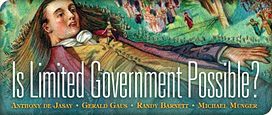Professor Gaus’s contributions of February 21 and 22 to the debate do not seek to answer my charge that his explanation of political outcomes via a holdall “utility function” (whose principal variables are moral sentiments) is both unverifiable and unfalsifiable. He does, however, make a variety of other assertions that do not seem to be conducive to close reasoning. Hence this re-rejoinder to his reaction to my rejoinder.
The controversy is best kept manageable by reducing it to its bare bones: is interest or the desire of fairness for others the dominant variable in motivating political outcomes?
For Gaus, “…the welfare state is not based on a power grab based on the pursuit of interests but on the majority’s sense of fairness.” Fairness is desired for others no less than for oneself. It is the chief variable in the “utility function.”
If this were true of everyone, better-off and worse-off alike, any collective choice rule would produce the “fair” result. Minority rule would generate much the same welfare state as majority rule. (The reason is that conflict over distribution would not exist).
Why, then, does Gaus need majority rule? The sole necessary reason I can see is that while a majority can be found “for” fairness, a minority will be against it. There will be distributional conflict. Government will buy “fairness” for some or all in the majority with the money of some or all in the minority.
Since rich-to-poor redistribution can always trump (has a greater potential “yield”) than poor-to-rich redistribution, a bid offering “fairness” to the worse-off will beat a rival bid offering “unfairness” to the better-off. Hence the worse-off and the middle will form the majority and the better-off the minority.
This stylized result is obtained by using the fairness motive as represented by Gaus. Precisely the same result has been obtained long ago by using the interest motive. It is puzzling to find Gaus arguing passionately that one is right and the other wrong.

